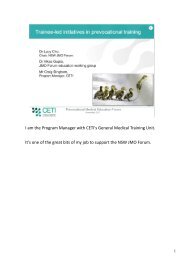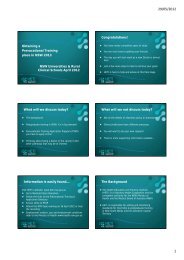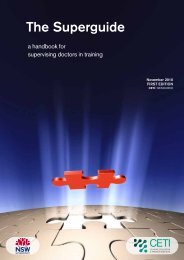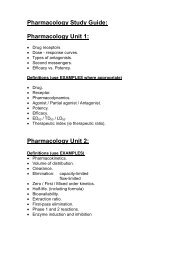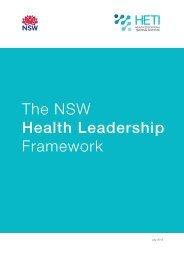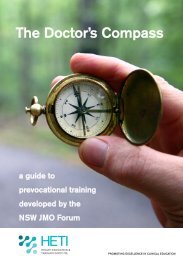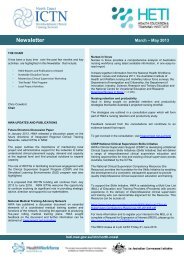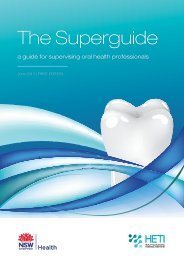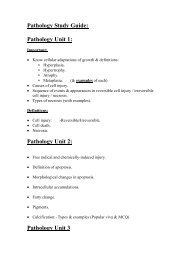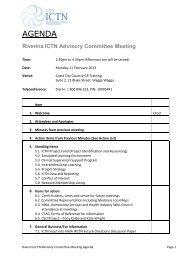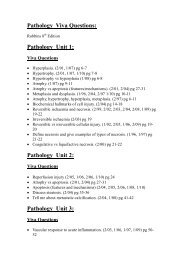a handbook for supervising allied health professionals - HETI - NSW ...
a handbook for supervising allied health professionals - HETI - NSW ...
a handbook for supervising allied health professionals - HETI - NSW ...
Create successful ePaper yourself
Turn your PDF publications into a flip-book with our unique Google optimized e-Paper software.
Transfer of a patient to an external facility <strong>for</strong> rehabilitation from one speech pathologist<br />
to another.<br />
Introduction: Hello I am (name), speech pathologist calling from the acute stroke unit at<br />
the Royal Hospital. I am calling to hand over care of Mr Smith who is being transferred to<br />
the rehabilitation ward at your facility this afternoon. Will you be the person managing him<br />
in rehab<br />
Situation: Mr Smith is a 78 year old gentlemen who currently has moderate<br />
oropharyngeal dysphagia, and moderate dysarthria affecting intelligibility in conversational<br />
speech. His language is functional but mild aphasia is present. He is currently on a<br />
modified minced diet with nectar fluids, is taking medication orally and his chest is clear.<br />
He has right upper and lower limb weakness affecting his ability to self-care, including<br />
feeding himself. He requires the assistance of one person to mobilise with a transfer belt<br />
and assistance of one <strong>for</strong> self care.<br />
Background: The patient presented at Emergency on 31 May 2011 with slurred speech<br />
and right upper limb weakness. The CT showed the presence of a left middle cerebral<br />
artery thrombolytic stroke. The patient has a history of high LDL cholesterol, IHD and<br />
diabetes. He is retired and was previously living independently at home with his wife who<br />
is fit and well. He has a supportive son who lives nearby.<br />
Assessment: A swallowing assessment from speech pathology demonstrated a weak,<br />
delayed swallow and high aspiration risk. A subsequent modified barium swallow (MBS)<br />
was conducted, resulting in him being placed on a modified minced diet with nectar fluids<br />
due to delayed swallow with pooling in the pharyngeal valleculae leading to aspiration<br />
risk. He has also been receiving dysarthria therapy once a day directed at improving<br />
intelligibility while in the acute stroke unit. The family has been present during therapy<br />
sessions and are keen to participate in the treatment plan <strong>for</strong> the patient to assist return<br />
to independent function. Based on his recent MBS, the patient continues to require a<br />
modified diet, but is keen to progress to normal fluids as soon as possible.<br />
Recommendation: Based on his risk of aspiration and ongoing speech difficulties,<br />
Mr Smith would benefit from therapy to improve oro-facial muscle tone, conversational<br />
speech intelligibility and a possible repeat MBS prior to progressing to thin fluids. It is<br />
recommended that Mr Smith undertake a period of inpatient rehabilitation to achieve his<br />
goals of enhanced swallowing function and improved speech quality. A follow up MBS<br />
may also be required.<br />
Thank you <strong>for</strong> taking over care of this patient. I have completed a detailed discharge report<br />
which I will fax over to detail the treatment plan to date and recommendations. A separate<br />
MBS report will also be attached. Do you have all the in<strong>for</strong>mation you need to take<br />
over care of this patient Please don’t hesitate to page/phone me if you require further<br />
in<strong>for</strong>mation.<br />
SECOND EDITION<br />
Example: handing over by phone with ISBAR<br />
<strong>HETI</strong><br />
THE SUPERGUIDE<br />
51



